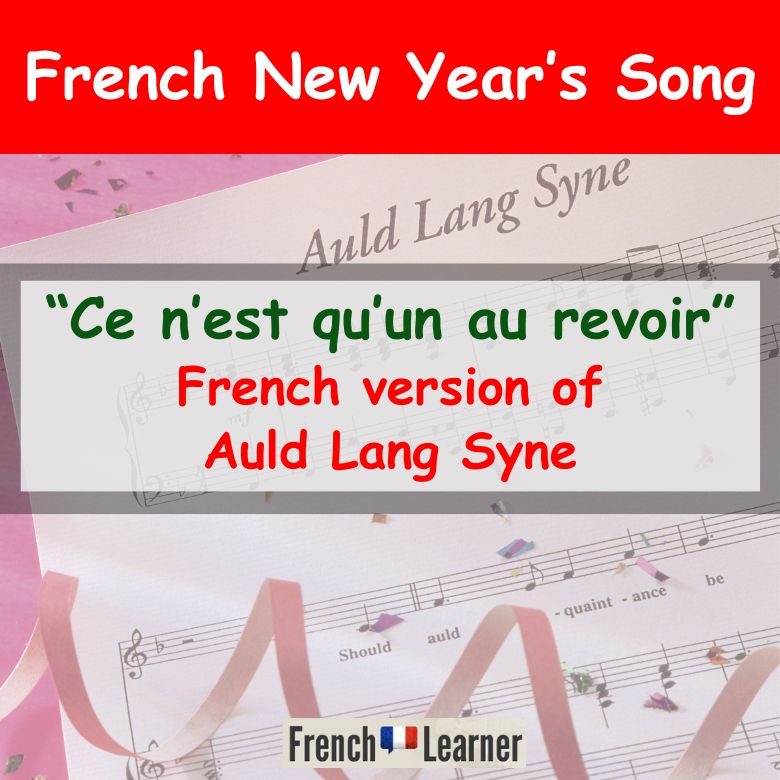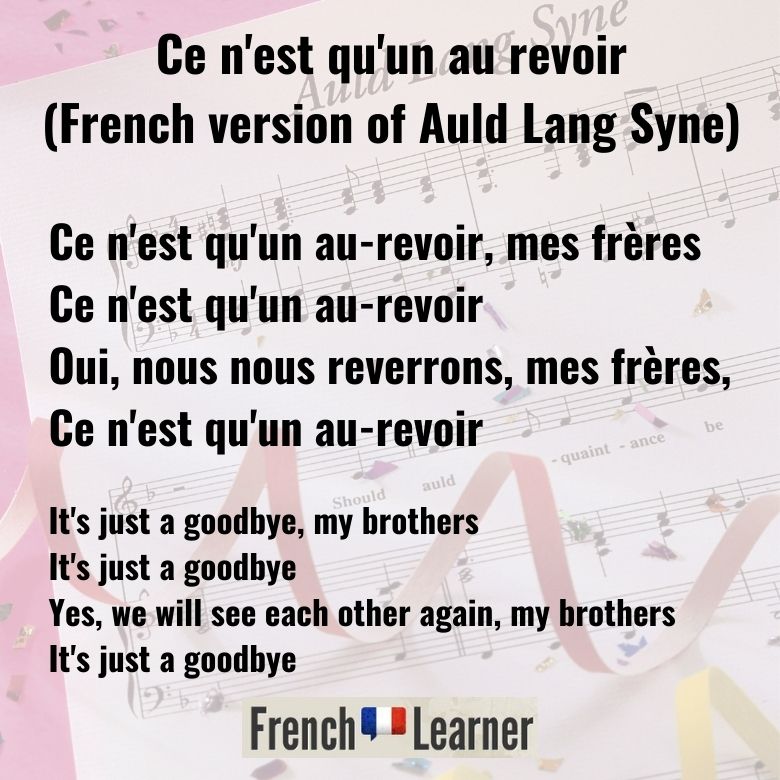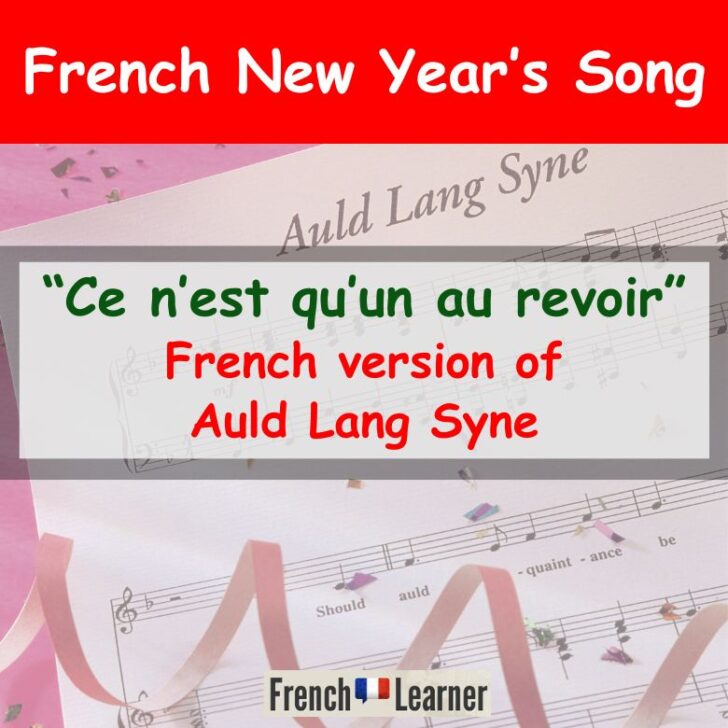Ce n’est qu’un au revoir (Meaning: It’s just a goodbye, Till we meet again) is the title of the French version of Auld Lang Syne. This song is sung both in English and French at the stroke of midnight at the near year. The post provides an English translation of the French lyrics, as well as line-by-line explanations of the lyrics’ vocabulary and grammar.

Ce n’est qu’un au revoir song background
The original English version, Auld Lang Syne, is a Scottish song written by Robert Burns in 1788 and was based on an older folk song. There are several translations for the song’s Scottish title including “old long since”.
According to the French wiki page, the song’s French lyrics are not an exact translation, but an adaptation that maintains the rhythm of the music. In addition to new year’s, the song is also sung as a way to say goodbye at other occasions.
Listen to Ce n’est qu’un au revoir
We suggest listening to the song once with the video below. Then, read through the explanation of the lyrics’ vocabulary and grammar. After that, listen again and see how much more you understand!
Lyrics vocabulary and grammar explained
This following section offers a line-by-line explanation of the French song lyrics.
Faut-il nous quitter sans espoir
This line translates to “Do we have to leave each other without hope“. Faut-il is the inverted form (a form used for asking questions) of il faut, which means “it’s necessary” or “has to”.
The verb quitter means to leave. In the reciprocal reflexive form (meaning ‘to each other’), se quitter means “to leave each other”. This page on our site covers French reflexive verbs in detail.
The preposition sans means “without” and the noun espoir means “hope”.
Sans espoir de retour
This line translates to “Without hope of return”. The preposition de can translate to “of” or “from”. The noun retour means return.
Ce n’est qu’un au-revoir, mes frères
This line (an also the song‘s title) transaltes literally to “It’s just a goodbye, my brothers“. Ce n’est que means “it’s just” or “it’s only”. The negation form ne…que means “only. This page on our site covers French negation rules in detail.
While au-revoir as noun means a “farewell” or “goodbye”, its literal translation is “to see again”. Hence, the French song title could translate to “it’s just a see you again”. The French title could also be loosely translated to “Till we meet again”. The page on our site explains au revoir in detail.
Mes frères means “my brothers”. Our page covering French family vocabulary explains how to pronounce frère.
Oui, nous nous reverrons, mes frères
This line translates to “Yes, we will see each other again, my brothers“. Oui means yes in French. Nous nous reverrons is the reciprocal pronominal form of se revoir (to see each other again).
Formons de nos mains qui s’enlacent
This line translates to “Let’s form with our interlaced hands“. The verb former means to form or shape. The reflexive verb s’enlacer means to intertwine, interlace or to embrace.
Au déclin de ce jour
This line transaltes to “As this day ends“. Déclin refers to the setting of the sun and can also simply mean “decline”.
Une chaîne d’amour
This line translates to “A chain of love“. Chaîne means chain an amour means love.
Unis par cette douce chaîne
This line translates to “United by this sweet chain“. Uni means “united” in French, as in les États-Unis (the United States). The adjective doux (douce in the feminine form) has many meanings including soft and sweet.
Ne faisons point d’adieu
This line translates to “Let’s not say farewell“. When working on the translation were were unable to find the expression “faire point d’adieu” and hence used a translation we found on mamalisa.com.
Car Dieu qui nous voit tous ensemble
This line translates to “Because God sees all of us together“. Car means because in French and dieu translates to God. Qui means who in French.
Voit is the third-person singular form of voir (to see). Tous means “all” or “everybody”. French Today covers this word in detail in this post.
Et qui va nous bénir
This line translates to “And who will bless us“. Bénir means “to bless” in French.
Saura nous réunir
This line translates to “He will know how to reunite us“. Saura is the third-person singular form of savoir (to know) in the future tense. In French grammar, savoir + infintive means to know how to do something.

Ce n’est qu’un au revoir lyrics and translation
Faut-il nous quitter sans espoir,
Sans espoir de retour,
Faut-il nous quitter sans espoir
De nous revoir un jour
Do we have to leave each other without hope
Without hope of return
Do we have to leave each other without hope
Of seeing each other some day
Ce n’est qu’un au-revoir, mes frères
Ce n’est qu’un au-revoir
Oui, nous nous reverrons, mes frères,
Ce n’est qu’un au-revoir
It’s just a goodbye, my brothers
It’s just a goodbye
Yes, we will see each other again, my brothers
It’s just a goodbye
Formons de nos mains qui s’enlacent
Au déclin de ce jour,
Formons de nos mains qui s’enlacent
Une chaîne d’amour.
Let’s form with our interlaced hands
As this day ends
Let’s form our hands that embrace each other
A chain of love
Ce n’est qu’un au-revoir, mes frères
Ce n’est qu’un au-revoir
Oui, nous nous reverrons, mes frères,
Ce n’est qu’un au-revoir
It’s just a goodbye, my brothers
It’s just a goodbye
Yes, we will see each other again, my brothers
It’s just a goodbye
Unis par cette douce chaîne
Tous, en ce même lieu,
Unis par cette douce chaîne
Ne faisons point d’adieu.
United by this sweet chain
Everybody in this same place
United by this sweet chain
Let’s not say farewell
Ce n’est qu’un au-revoir, mes frères
Ce n’est qu’un au-revoir
Oui, nous nous reverrons, mes frères,
Ce n’est qu’un au-revoir
It’s just a goodbye, my brothers
It’s just a goodbye
Yes, we will see each other again, my brothers
It’s just a goodbye
Car Dieu qui nous voit tous ensemble
Et qui va nous bénir,
Car Dieu qui nous voit tous ensemble
Saura nous réunir.
Because God sees all of us together
And who will bless us
Because God sees us all together
He will know how to reunite us
Conclusion
Et voilà ! You know know the lyrics to Ce n’est qu’un au revoir (the French version of Auld Lang Syne). Want some more holiday songs? This post on our site covers a great list of popular French Christmas songs you’ll love!
All posts by David Issokson

